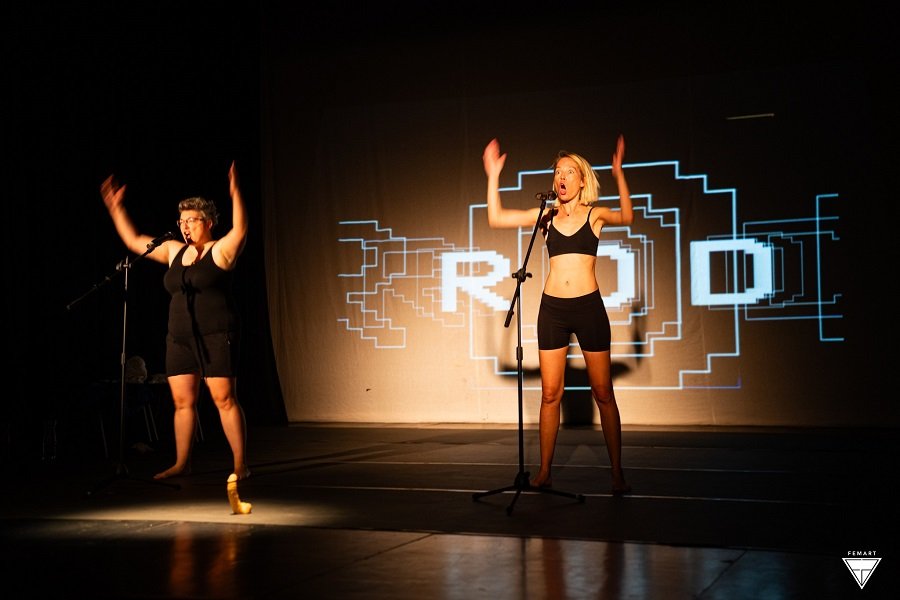By: Shqipe Malushi
In the heart of Prishtina, at the iconic Dodona Theater, Day 2 of the FemArt Festival brought an electrifying performance that had the audience on the edge of their seats. The thought-provoking play, “World Without Women,” by Serbian artists Olga Dimitrijevic and Maja Pelevic, was nothing short of a powerful statement on gender inequality in the world of theater. With every word, every movement, and every subtle nuance, these two women turned the spotlight on the harsh realities many still face.
The FemArt Festival, now in its 12th edition, has grown into more than just a cultural event. It is a vibrant symbol of activism, artistry, and the fight for equality. As the region’s first feminist festival, it continues to elevate voices advocating for women’s rights and those of marginalized groups. This year’s event has gathered over 200 international artists and performers from all corners of the globe, all united by one mission – to amplify the voices that too often go unheard.
On this evening, Olga and Maja took the stage, dressed in casual sports gear, holding a football. Their performance began with what seemed like an everyday conversation, but it quickly unraveled into an exposé of gender discrimination in Serbia’s theatre world. With wit, humor, and unapologetic honesty, they revealed shocking statistics, stark imbalances, and the frustrating reality of a male-dominated industry.
Their dialogue wasn’t just a list of grievances; it was a raw and poignant portrayal of inequality. They spoke of women in theatre who struggle to be paid, who are rarely seen in leadership positions, and who face harassment and a lack of respect. Their words resonated deeply with the audience, as the performers oscillated between humor and anger, making it impossible to ignore the weight of their message.
At one point, the tension between the characters grew. One actress defended the theatre, while the other, exhausted by the relentless inequality, declared she was ready to leave the industry altogether. The backdrop of digital screens projected the thoughts and opinions of other women – mothers, daughters, fellow performers – each sharing their own battles with gender discrimination.
The performance wasn’t just a show; it was an immersive experience. The performers asked the audience personal questions about their work, their happiness, and their own experiences with inequality. And when the show seemed to reach its climax, Olga made a striking decision – she quit theatre on stage, symbolically transitioning into a new role as she began making crepes. As the smell of fresh crepes filled the air, the audience was invited to join her on stage.
The power of the final scene was undeniable. One by one, audience members who felt discriminated, who were single, divorced, or had suffered inequalities, came forward to receive a crepe. What began as a small group soon grew until the entire audience stood united on stage, sharing food and solidarity. This simple act of offering crepes became a symbol of community, of nourishing one another, and of standing together in the face of a system that too often divides.
As one woman in the audience said afterward, “I love FemArt. I come every year because it engages everyone. It brings out the art in us. I wish we had this quality and standard all year round.”
Olga and Maja were met with thunderous applause, their performance a brilliant mix of humor, frustration, and hope. For those who didn’t speak Serbian, the English subtitles kept the laughter alive, ensuring that the play’s humor and depth reached every corner of the theater.
FemArt Festival once again reminded us of the power of art to spark change, and “World Without Women” stood as a bold, creative challenge to a system in need of transformation. The performance left its mark, not just as a theatrical piece, but as a rallying cry for equality – a call to action that resonated long after the curtains fell.

